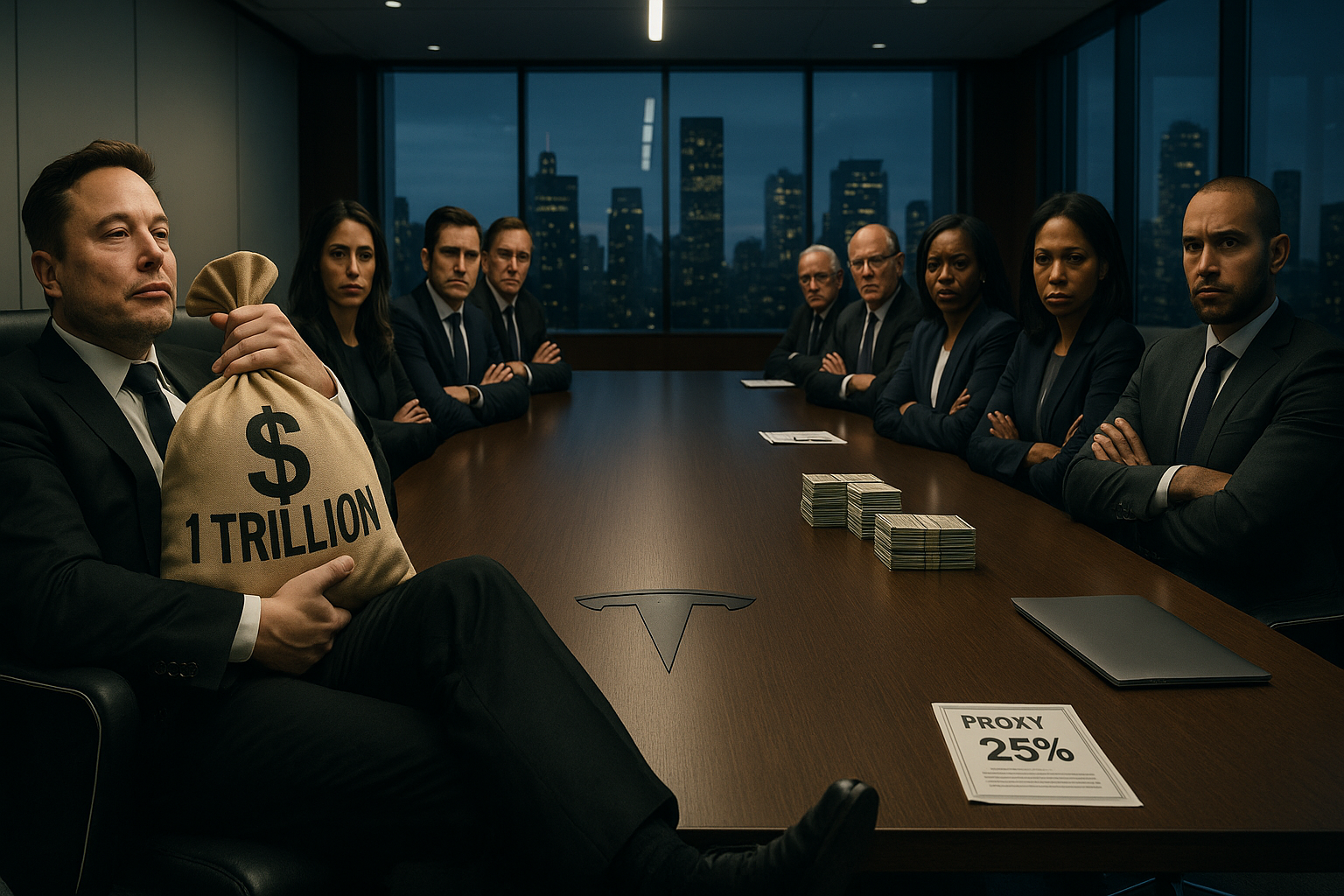The business world has never seen anything quite like this—and that's saying something.
As Tesla prepares to drop its quarterly numbers, we're watching what might be the most brazen corporate compensation showdown in the history of American capitalism. Elon Musk, apparently unmoved by that Delaware court decision that torpedoed his previous $56 billion pay package, is now pushing shareholders to approve... wait for it... a compensation plan worth $1 trillion.
Yes, trillion. With a T.
Look, let's just be honest about what's happening here. This is essentially a hostage negotiation, with Tesla shareholders on one side and their celebrity CEO on the other. The subtext isn't subtle: "Hand over my trillion bucks plus 25% voting control, or maybe I'll be too 'uncomfortable' to stick around and deliver those robot taxis you're all banking on."
I've covered executive compensation battles for years, and this one has a different flavor altogether. There's a breathtaking audacity to it.
The timing couldn't be more dramatic. A shareholder rebellion called "Take Back Tesla" (spearheaded by the American Federation of Teachers and Public Citizen) is gathering steam, trying to rally pension funds and individual investors against what they're not-so-diplomatically calling a "ransom attempt" from a CEO whose attention seems scattered across the solar system.
What we're seeing unfold is what I like to call the "Indispensable Genius Paradox." It's a phenomenon I've observed repeatedly in tech—though never at this scale. The pattern goes something like this: truly exceptional founders do create massive value through their unique vision and abilities. But once they believe themselves to be irreplaceable (and convince enough people they're right), there's almost no limit to the compensation and control they can demand.
Tesla's board is making a straightforward case: Musk's astronomical compensation package is the price of keeping him focused on the company for the next decade. It's the "he's worth it" argument.
But here's the catch (there's always a catch): the coalition of rebellious shareholders points out that the proposed package doesn't actually require Musk to focus primarily on Tesla. He's free to keep juggling his portfolio of little side projects—you know, trivial distractions like running Twitter/X, launching rockets at SpaceX, developing brain chips at Neuralink, and building an AI company that, awkwardly enough, might compete with Tesla's own AI ambitions.
"An absentee CEO" with an "insufficiently independent" board—that's how New York City Comptroller Brad Lander described the situation. His office oversees funds with about $1.1 billion in Tesla stock, so it's not exactly a casual observation.
The market itself seems unsure about Musk's divided attention. Tesla stock has bounced back somewhat recently, but it's still lagging behind both the S&P 500 and the Nasdaq this year. Turns out even Elon Musk—perhaps especially Elon Musk—can't effectively run five companies simultaneously while wading into political controversies and picking fights on social media. Shocking, I know.
This whole drama represents a fascinating stress test for shareholder capitalism. When both major proxy advisory firms (ISS and Glass Lewis) recommend against your compensation package, that usually means something. Tesla's counter-argument? Essentially, "These firms always hate us, but our shareholders have gotten rich anyway!"
That's... not entirely wrong. Until it is.
There's a bigger picture here that transcends Tesla itself. We're witnessing the logical endpoint of a decades-long shift in power toward founder-CEOs in public companies. At least Meta and Alphabet made their control structures clear from the beginning with dual-class shares. What Musk is attempting feels different—a retroactive power grab justified by the supposed indispensability of his genius.
(And let me tell you, having interviewed dozens of founders over the years, they all think they're indispensable. Some of them are even right.)
The precedent this sets is troubling. If Tesla shareholders cave to these demands, what's to stop the next tech wunderkind from insisting on even more outrageous terms? "Sorry, I simply cannot focus on this quantum computing breakthrough unless you guarantee me 35% voting control and a $3 trillion compensation package." Once you move these goalposts, they rarely move back.
As Tesla gets ready to share its Q3 results—with analysts expecting modest revenue growth of about 4.7% after two consecutive quarters of year-over-year declines—the central question becomes unavoidable: just how much is Musk's continued attention actually worth? And is there a point where even the most brilliant visionary becomes too expensive?
Next month's shareholder meeting will give us the answer. Will investors double down on their belief in Musk's irreplaceable vision? Or will they finally draw a line and say: enough's enough, buddy—even geniuses have their limits.
I'm betting the outcome will tell us more about power dynamics in modern capitalism than any business school case study ever could.
